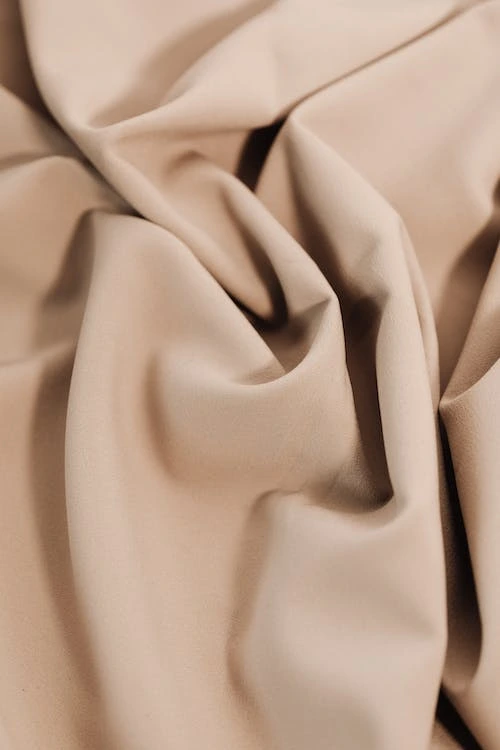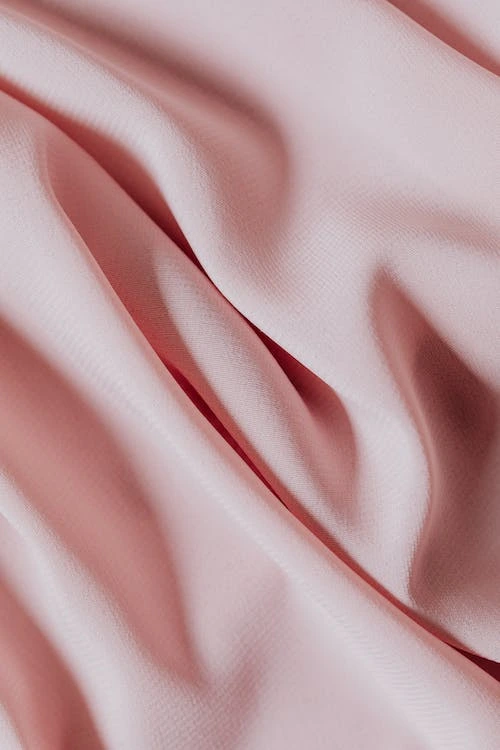The Abaya fabric and material should be the primary crucial variables because they can significantly distinguish the type of garment that will experience comfort and stun versus an Abaya that might have been uncomfortable for the weather. Additionally, being aware of the Abaya’s fabric will help you choose wisely when making your preference.
Let’s begin and continue an overview of abaya fabrics with some of the textiles that are most frequently found in abayas:
What Is Abaya?
Muslim women frequently dress in abayas, which are typical garments. Usually, it is a long, comfortable gown that encloses the whole body, leaving only the face, feet, and hands visible. The dress was invented in Saudi Arabia and has since spread to other countries in the Middle East and North Africa. Despite occasionally varying from beige or dark blue colors in line with current trends, abayas are typically black.
The Arabic word “awbyah” is where the word “abaya” originates. To put on gently is the meaning of this phrase. For this purpose, many Muslims view an abaya as appropriate clothing for women who want to preserve their beliefs and maintain self-respect. While some nations have laws mandating that women protect their entire bodies with an abaya, others still need to enact these rules and give people the option of donning one.
Based on where they come from and what they will be used for, abayas can have a wide range of designs. A design might have elaborate embroidery around the edges, while another might have extra fabric covered over the arms or legs for more protection. More ornamental components, like lace or velvet, are frequently used to decorate abayas that have been Westernized.
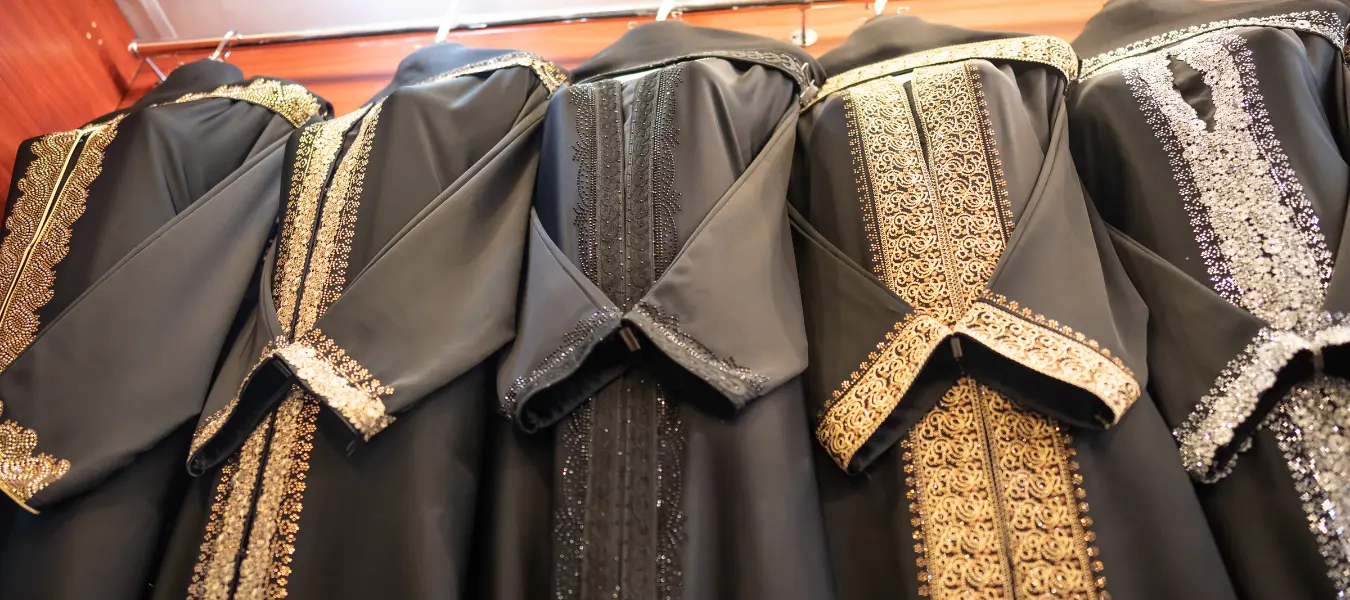
Muslim women have worn abayas as outerwear for centuries in many different countries and cultures. Its distinctive characteristics continue to be that it has to cover the whole body; however, there is freedom in design differences that target various feels and choices.
The Abaya Origin
Muslim women in the Middle East have a long history of dressing in abayas. The Arabic base of Abaya, which means “to cover,” is most frequently linked to Islamic customs and values. An abaya was traditionally worn to indicate self-respect as required by rules of religion and to symbolize one’s beliefs. The attire, frequently seen in Saudi Arabia, Kuwait, Bahrain, and other Gulf nations, has developed over time into an expression of style reflecting regional traditions and personal fashion preferences.
The Abaya has its roots in antiquity when people wore it to save themselves from the arid conditions of the desert. Additionally, it protected women from undesirable glances and abuse when they were present in the public eye. While the style and materials have changed as time passed, some aspects have remained consistent, such as the gown’s typical length, which is close to the ankle and ensures that self-respect is upheld.
Given its complicated past and varied views across various cultural contexts, several distinct cultures see the Abaya in today’s society. For instance, in some regions of Africa, it is still seen as an indicator of wealth rather than a garment that anyone should use, irrespective of their socioeconomic place or gender identification. In contrast, it is frequently seen as more useful for daily use in Arab nations like Saudi Arabia instead of being viewed exclusively via an ideological perspective.
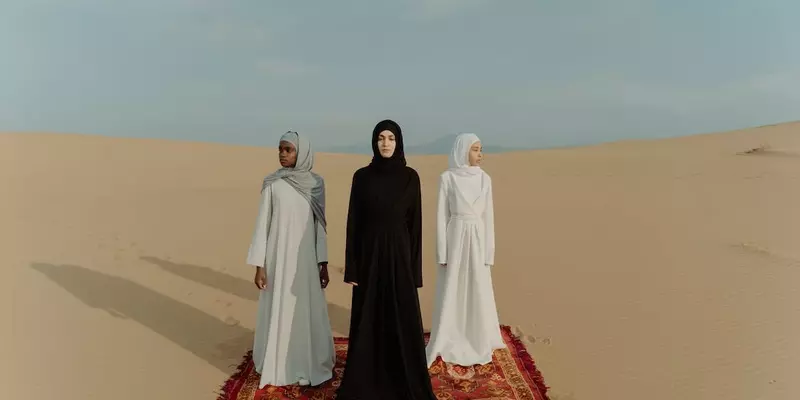
These include older people, who appreciate the religious significance of the Abaya, as well as younger people, who observe it as a means of expressing their belonging and continue to be fans of the garment. This variety describes what makes them so special because they can cross limitations between faith, society, and fashionable trends while offering ease, safety, and elegance to those who want to wear them.
Abaya Fabric Details and Properties:
1. It must be impervious to wrinkles when in use.
2. The abaya fabric should be delicate to the contact and have an elastic regularity.
3. It should come from an unprocessed product to avoid the body experiencing allergic responses.
4. It should be comfortably cool, and refrain from raising body temperature.
5. The body underneath must be kept from being revealed or hinted at.
How Do Abayas Fabric Types Differ?
Consistency must be taken into consideration when choosing an abaya fabric because it can make a big difference between a garment that feels good and is appropriate for the weather. To make the most effective option, it can help to have a basic grasp of what an abaya’s fabric is.
1. NidhaI
Since this plentiful, beautiful, and fragile weave is made entirely of polyester, warm climates are the best fit. It produces outstanding Abayas that are comfortable to use.
2. Linen
The linseed provides the fibers for crepe fabric, which is several times more routes than cotton due to using this type of weave. This results in an Abaya of excellent quality. Additionally, thanks to its trend, it has great intensity-directing properties, making it perfect for abayas in the summer.
3. Satin
When set under stress, this fabric’s flexible, single-sew material may crumple at its ends. Its versatility allows it to be used for tops, clothes, skirts, and—more significantly—thin, fitted abayas.
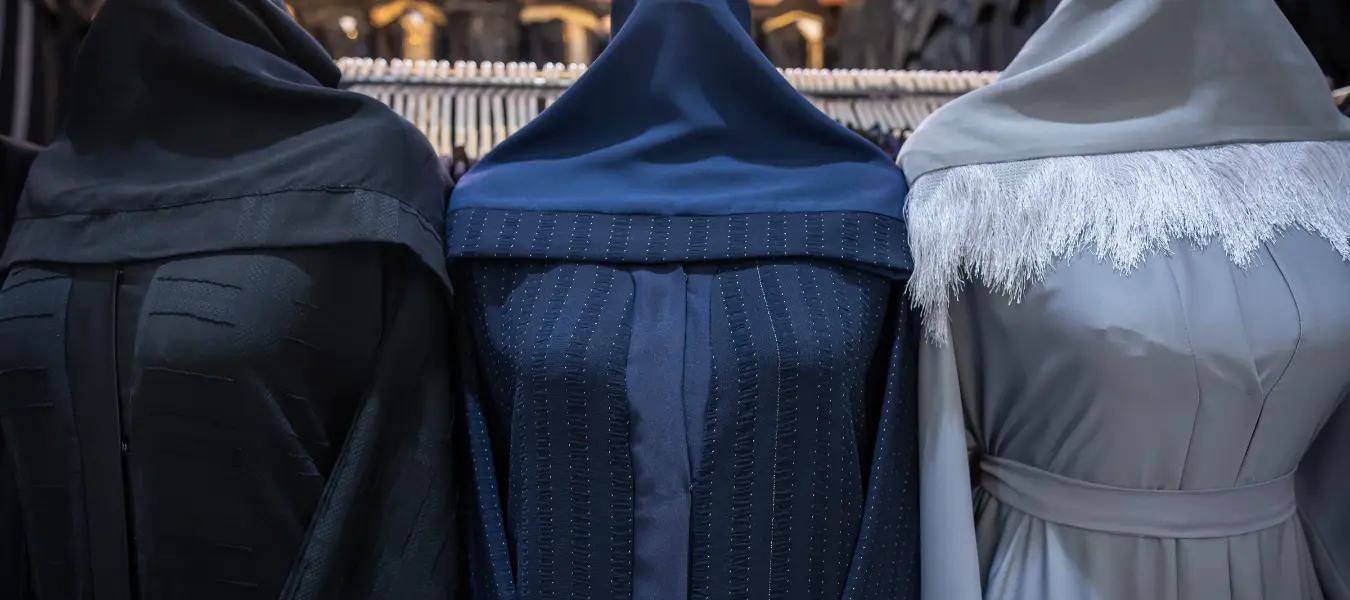
4. Chiffon
This design is much more extravagant than silk, an unprocessed material silkworms produce. Glossy silk is known to be an opulent fabric that is used more frequently for outstanding night attire.
5. Georgette
It is a beautiful material that is similar to chiffon but is thicker and mistier in appearance. It is particularly used for Asian clothing like sarees because of its range of durability. In any event, it can produce lovely light abayas.
6. Cotton
Silk is a gorgeous textile material created by silkworms. This pricey fabric, renowned for its superiority, can be used to make opulent abayas.
7. Jersey
An organic texture that is typical and has some advantages when used to make outfits. It is pleasant and works great for protection.
8. Polyester
Abayas are made of a synthetic fiber containing some cotton to make it comfortable to put on the body. Washing it is simple.
9. Nogoso
Nogoso is an end-user favorite. Nogoso is a plain-colored fabric that is well known for requiring little ironing. It is smooth, with straight lines throughout. Nogoso is an airy material that will win your heart because it gives you form while allowing plenty of movement.
10. Crinkle
Crinkle’s ironless characteristic is a favorite for women who prefer an effortless outfit. It’s understandable why Crinkle has become one of society’s favorite materials because it’s portable, light, and ideal for everyday use.
11. Lace Material
It is a unique abaya fabric that enhances aesthetics, style, and beauty; as a result, it can be applied completely in the making of abayas or only on any component of the Abaya. It is additionally recognized as a costly material that was meticulously selected. It is one of the fabrics that require special cleaning and laundry techniques.
Although these abaya fabrics are popular, they might only be some of what is available. Abayas fabrics can be very different, but some may need to be of better quality, making the abayas uneasy and weighing them down.
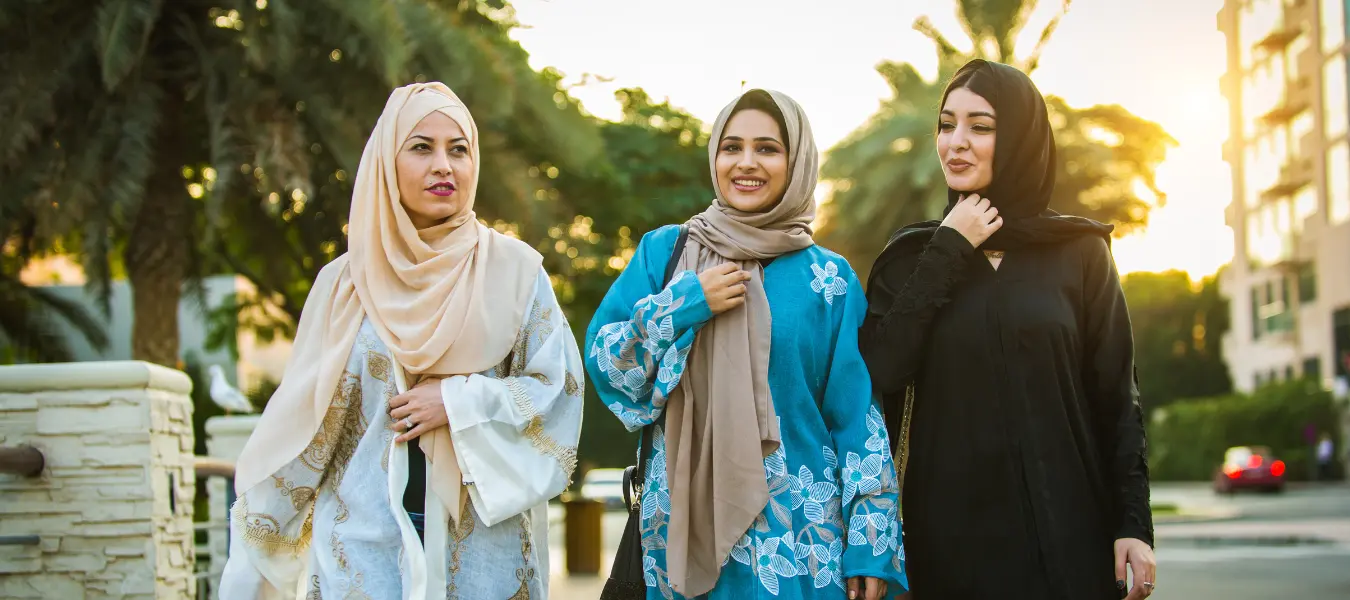
When choosing Abaya fabric, consider these key factors:
Climate and Weather: Select fabrics based on your region’s climate. For hot weather, opt for lightweight and breathable materials like Nida Matte, Crepe, Cotton, or Linen. In cooler climates, heavier fabrics like Silk, Nida Matte, and Satin offer warmth.
Occasion: Match the fabric to the event. Silk and Satin are ideal for formal occasions, while Linen and Cotton are better suited for casual wear. Ensure the fabric complements the formality of the event.
Comfort and Movement: Prioritize comfort and ease of movement. Fabrics like Jersey and Cotton are flexible and comfortable, making them suitable for daily wear. Avoid fabrics that restrict mobility to ensure a comfortable fit.
Conclusion
An abaya is not only a religious garment for Muslims; it is also quickly becoming in style worldwide. So, when selecting an abaya fabric, look for the appropriate material. When you get the proper abaya fabric, you can select a design that is convenient for you.
Abaya Fabric Trading and Manufacturing
Abaya fabric trading and manufacturing involve a specialized sector dedicated to producing and supplying high-quality fabrics used in the creation of abayas, traditional Islamic garments. This industry serves a diverse clientele across various global markets, reflecting the rich cultural heritage and contemporary fashion needs.
Karim Al-Dar,
At Karim Al-Dar, we specialize exclusively in abaya fabrics. Since 1900, and based in Dubai since 1970, we have dedicated over 120 years to mastering textiles and fashion fabrics. Our passion is evident in every piece, from classic jet blacks to stunning dyed options, and from silky crepes to elegant jacquards. We cater to a wide range of needs with a focus on elegance and tradition.
The abaya, a symbol of tradition, respect, and individuality, is deeply ingrained in Arab culture and has gained global recognition. At Karim Al-Dar, we honor this heritage by staying aligned with international fashion trends and working closely with garment manufacturers, designers, and retailers across the Middle East.
Our mission is to celebrate the identity and values represented by the abaya. We are committed to socially responsible practices and work to establish ethical supply networks. Built on the principles of tradition, trust, integrity, and accountability, Karim Al-Dar continues to be a trusted partner in the textile industry. We are proud members of the Al-Dar Textile & Apparel Group.
Guangzhou Running Long Way
Guangzhou Running Long Way Electronic Commerce Co., Ltd., based in Panyu Area, Guangzhou City, Guangdong Province, China, specializes in exporting a diverse range of products, including abayas. The company operates from a 10,000 square meter facility with around 300 experienced staff members. They offer both ODM and OEM services, supporting various customization needs.
Equipped with over 10 advanced assembly lines and automatic development machinery, their production capacity reaches up to 3 million apparel items annually, generating more than $100 million in output value. The company adheres to HSE international industry standards, ensuring that all textile products, including abayas, are crafted from high-grade, comfortable fabrics.
Running Long Way exports over 90% of its abayas and other garments globally, serving markets across America, Oceania, Japan, Europe, South Korea, Africa, Southeast Asia, and the Middle East. Their primary products include Cotton, Jersey, Chiffon, Jamawar, Silk, Polyester, Lycra, Viscose abayas, and Burqas.
Fuzhou ITB
Fuzhou ITB Promo Co., Ltd., situated in Zhaoan Park, Zhangzhou City, Fujian Province, China, is a leading supplier of abayas and related garments. The company operates from a 4,000 square meter facility, employing approximately 250 skilled workers. They offer both ODM and OEM services to cater to various customization needs.
Equipped with advanced manufacturing equipment and up to 4 top-grade automatic production lines, ITB Promo’s annual output value ranges from $2.5 to $5 million. The firm ensures that all its products, including abayas, are made from durable fabrics that meet stringent industry standards, including IATF, HSE, BSCI, GMP, ISO, OHSAS, and QC certifications.
Exporting over 90% of its apparel to global markets, ITB Promo serves regions such as Europe, Africa, Australia, America, Oceania, Japan, the UK, Southeast Asia, South Korea, and the Middle East. Their product range includes Jersey, Chiffon, Jamawar, Cotton, Silk, Polyester, Lycra, Viscose abayas, and Burqas.

Pakistan AJM
Pakistan AJM Trade House Co. Ltd., located in Abbottabad City, Khyber Pakhtunkhwa Province, Pakistan, brings over 7 years of experience in the manufacturing of abayas and other garments. Specializing in bulk production, the company is equipped with advanced manufacturing lines and high-quality machines, enabling an annual output of approximately 100,000 abayas.
AJM Trade House offers ODM and OEM services, catering to various customization needs. The company exports a significant portion of its products, including Polyester, Lycra, Viscose, Cotton, Jersey, Chiffon, Jamawar, and Silk abayas, as well as Burqas, to global markets such as Europe, Japan, South Korea, America, Africa, Southeast Asia, and the Middle East.
Regal Fabrics
Regal Fabrics, a leading fabric store in the Middle East with over 70 years of experience, operates 12 retail locations across the UAE and Qatar. Known for its high-quality textiles and vibrant patterns, Regal Fabrics has made significant strides in the industry.
In 2019, Regal Fabrics embraced the digital age by launching its e-commerce platform. This move was not merely about selling fabric but about connecting with customers worldwide. The online store serves as a virtual extension of Regal’s brand, ensuring that the Regal experience reaches customers directly, wherever they are.
Guangzhou AY Collection Fashion
Guangzhou AY Collection Fashion Co., Ltd., established in 2004 in Guangzhou City, China, specializes in supplying abayas and various apparel items. Spanning 6,000 square meters, the company employs around 270 skilled staff and offers ODM and OEM services.
AY Collection exports a wide range of abayas and other garments to international markets, including Ghana, Nigeria, the UK, South Africa, Europe, Japan, South Korea, Southeast Asia, and the Middle East. Their product lineup features Cotton, Jamawar, Silk, Jersey, Chiffon, Polyester, Lycra, Viscose abayas, and Burqas.
Mona Electronic and Textile Trade
Mona Electronic and Textile Trade Co., Ltd., founded in 1997 in Istanbul, Turkey, is a leading manufacturer of abayas and various apparel items. The company handles large-scale orders efficiently, supported by ODM and OEM services.
With advanced automated production lines and high-quality machinery, Mona Textile Trade has a capacity of around 80,000 abayas annually. They export a significant portion of their products to Europe, America, Southeast Asia, Africa, South Korea, Japan, and the Middle East.
Their primary products include Silk, Polyester, Lycra, Viscose, Cotton, Jersey, Chiffon, and Jamawar abayas.
Guangzhou Eiffel Textile
Guangzhou Eiffel Textile Co., Ltd., located in Huan Shi West Rd., Yuexiu District, Guangzhou, China, is a prominent exporter of abayas and other garments. With a facility covering approximately 3,000 square meters and a team of about 100 skilled staff, they offer ODM and OEM services.
The company adheres to ISO 9001 quality standards, ensuring their abayas are made from durable, high-quality materials. Eiffel Textile exports over 90% of its products to global markets including Europe, Africa, Sudan, America, Japan, South Korea, and Southeast Asia.
Their primary products include Silk, Polyester, Lycra, Cotton, Jersey, Chiffon, Jamawar, and Viscose abayas.
Hong Kong iGift Co
Hong Kong iGift Co., Ltd., located on Nathan Road, Hong Kong, is a reputable supplier of various products, including abayas. Known for its capability to handle large-scale orders efficiently, iGift provides ODM and OEM services to its clients.
The company ensures that all its abayas are made from high-quality materials, compliant with global standards such as FAMA and BSCI certifications. iGift exports the majority of its products to international markets including Europe, Africa, South Korea, America, Southeast Asia, and Japan.
Primary products include Cotton, Polyester, Lycra, Jersey, Chiffon, Jamawar, Silk, and Viscose abayas.
Joel & Son Fabrics
Email: [email protected]
Tel: +44 7395 444 444
website: www.joelandsonfabrics.com

Joel & Son Fabrics has a rich heritage of over 70 years, delivering high-quality fabrics worldwide. Known for our commitment to excellence, we continuously source and offer the most fashionable and technologically advanced materials. While our physical store remains a hub for fabric enthusiasts, our online shop ensures that our premium fabrics are accessible to customers globally.
Now led by Joel’s son, Gary, and his grandson, Coby, the company remains dedicated to upholding the exceptional product quality and customer service that have been our hallmark. Our luxurious Abaya fabrics, available in black, dark olive, taupe, and ivory, include options like georgette, jacquard, cloqué, and crépe, perfect for crafting bespoke traditional Muslim garments.
Our online collection features a wide range of couture and designer fabrics, including the finest silks, cottons, and velvets, all ready to be cut and delivered to your door. With decades of experience in sourcing the best textiles, Joel & Son Fabrics is proud to hold a Royal Warrant from HM Queen Elizabeth II, a testament to our dedication to quality and service.




